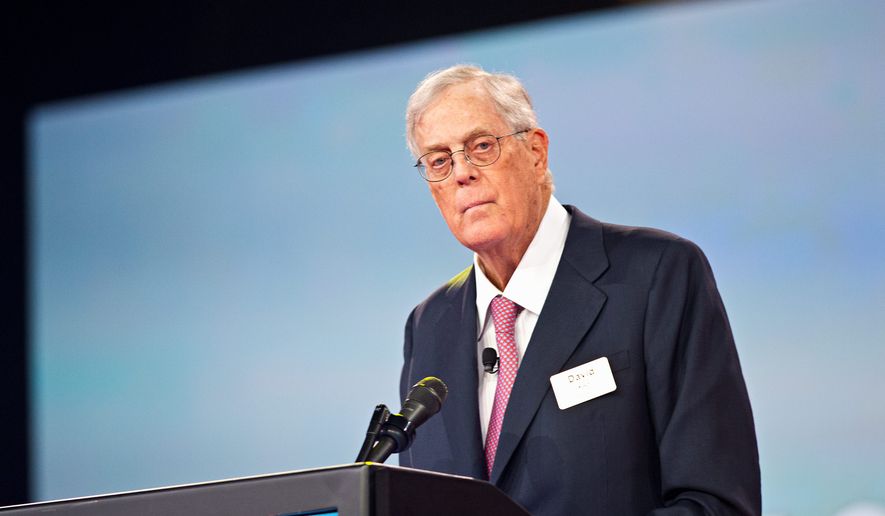The Koch network is mobilizing a massive advertising campaign and ground game to boost Republican candidates in key Senate races in November, bursting onto the scene after flying under the radar for most of the 2020 cycle following David Koch’s death.
The influential right-leaning political group, which remains staunchly anti-President Trump but isn’t working to defeat him, has homed in on the battle for the Senate.
Americans for Prosperity Action, the main political advocacy arm of the Koch network, jumped into the final two-month sprint of the campaign season with a $5 million wave of digital ads for GOP Senate candidates in Colorado, Georgia, Kansas, Montana, North Carolina and Texas.
The total amount of cash the Koch network intends to spend is far higher, however, and will reach $11 million in North Carolina alone, said Americans for Prosperity President Tim Phillips.
Americans for Prosperity also is deploying the largest ground effort in its history after discovering that the coronavirus pandemic created an unexpected boon for in-person canvassing.
Door-knockers found swing voters are much more willing to talk amid the social distancing restrictions, and the number of potential voters who answer the door and engage is up 17% from before the pandemic, the group says.
“Normally, swing voters, they do not feel that politics and what happens in Washington, D.C., has that big of an impact on their lives. They pay attention, therefore, only sporadically,” Mr. Phillips said. “They have other priorities. This year is fundamentally different. This year you have, or they have, the pandemic, the greatest economic dislocation and crisis in our nation’s history, and now a cultural clash, civil unrest that’s occurring as well.”
Americans for Prosperity is responding to the increased interest in in-person conversations by hiring dozens of part-time staffers in Colorado to supplement its activist network’s footprint. The group plans to add similar workers in other states in the coming months.
Americans for Prosperity began testing voters’ reception to door-knocking in June and then resumed its operations in July. Mr. Phillips’ team is finding there’s far less competition visiting voters’ doorsteps.
“What’s going to determine these Senate races and I think probably the presidential [race] as well is not any one issue — it’s the answer to a question,” Mr. Phillips said. “The question is: Which candidate gives me the best chance to get my normal life back? I think the candidates that answer that best are going to win.”
The Koch network’s new normal was forever altered last year when David Koch, the first chairman of the AFP Foundation and one-half of the influential Koch brothers duo, died. Mr. Phillips said Koch’s death was a “blow” but the group has worked to maintain the mission that Koch envisioned.
In 2020, that means ducking the presidential race entirely and rushing to the aid of vulnerable Republican-held Senate seats, such as Sen. Cory Gardner of Colorado and candidate Roger Marshall in Kansas.
The decision to stay out of some of 2020’s biggest fights has led to other groups, primarily the Club for Growth, establishing a new foothold as the prominent outside group helping conservatives win elective office as Republicans.
Whereas the Koch network has traditionally acted alone and sought to distance itself from partisan politics, the Club for Growth works closely within the GOP tent and has expanded its agenda beyond free-market economics to a wide variety of issues including school choice.
Club for Growth President David McIntosh said he decided to make the group the “biggest and the best political operation for the conservative movement inside the Republican Party” when he took it over in 2015.
Its shift from a group for the Tea Party insurgency to a group serving conservatives willing to work with GOP leadership is now complete. When the club decided to engage in congressional races in 2020, it coordinated with super PACs aligned with GOP leadership in both the House and the Senate.
“We can’t talk to the [Republican] party because we’re an independent expenditure group, but we can coordinate super PAC to super PAC,” Mr. McIntosh said. “When we’re engaged in a race, we talk to them, and we don’t just say, ‘Hey we’re doing this and you do what you think is best.’ We talk it through and then mutually decide.”
Mr. McIntosh said the same dynamic exists at the presidential level, where the Club for Growth is mindful of what super PACs such as the pro-Trump group Preserve America are running on-air so they each don’t waste resources. He said he thinks the group’s investments in Arizona and Wisconsin may have made a difference in improving Mr. Trump’s performance in recent polling.
In states where conservative groups are stepping on the gas pedal, the Koch network is hitting the brakes. Americans for Prosperity is staying out of Arizona, despite the vulnerability of incumbent GOP Sen. Martha McSally, and is only assisting Sen. David Perdue in Georgia, while waiting to see which Republican emerges in an anticipated runoff for the other Georgia Senate seat after November. Kansas is the rare exception where past elections spooked the group and have left it not wanting to take anything for granted.
The group thinks it can make a difference in six Senate races, 18 House races and nearly 200 state legislative seats as well as in New Hampshire Republican Gov. Chris Sununu’s reelection.
“We will focus on these six states and what we’re doing, frankly, no one else is doing and that’s literally hundreds of thousands of individual conversations with our field staff and local activists in these states, laser-beamed just on these Senate candidates that we’re supporting,” Mr. Phillips said.
• Ryan Lovelace can be reached at rlovelace@washingtontimes.com.




Please read our comment policy before commenting.